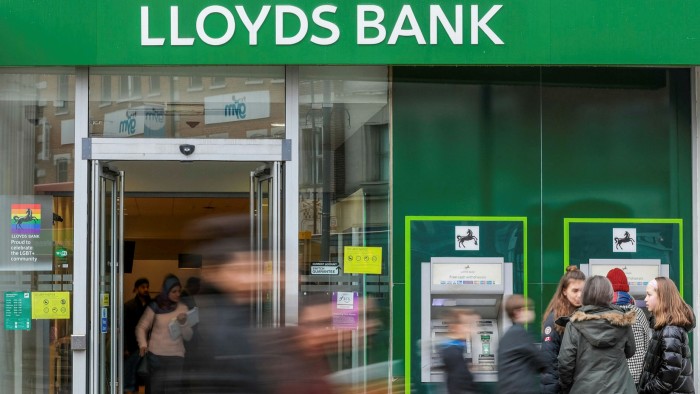Hedge funds slug it out over Lloyds Bank


Roula Khalaf, Editor of the FT, selects her favourite stories in this weekly newsletter.
A great battle of the hedge funds is brewing — a scrap between investors in Lloyds Bank but by extension also a battle for Britain.
With Lloyds widely seen as the stock market’s best proxy for the British economy, the UK’s biggest high street lender now finds itself at the centre of an epic tussle between bullish and bearish hedge fund investors.
Dominating the bears’ corner is Marshall Wace, the $49bn London-based hedge fund that has taken out a record £100m short position on the bank, convinced that the challenges it faces will drive down its share price even further from what are already near-all-time lows.
Longtime Lloyds bull and rival London hedge fund Lansdowne Partners has been on a generally losing streak, and has plunged from the top of the bank’s shareholder register to barely figure in the top 30. But it has been steadily reinforced by a clutch of other hedge funds and boutique investors. Harris Associates, a Chicago-based fund that has taken big bets across the generally unloved European banking sector, has built a near 7 per cent stake, making it the biggest single investor.
Longview, Artisan and Mondrian, three other specialist investment firms, are also in the top 10, reflecting a marked shift away from mainstream asset managers as the riskiness of Lloyds’ prospects has mounted.
The bank’s shares have halved this year: the economic impact of the coronavirus lockdown has led to higher projected loan losses, and the cut in central bank interest rates has slimmed already skinny margins. Those effects have compounded growing uncertainty about the UK economy and Lloyds’ fortunes caused by Brexit and the ever likelier prospect of a no-deal departure from the EU.
That Marshall Wace is behind the big short position has been viewed with bitter irony within the bank. There had long been unease that Lloyds’ own chairman, Norman Blackwell, had been a vocal Brexiter, despite dire predictions from Remainers about the damage Brexit could do. Now Paul Marshall, Marshall Wace’s co-founder and chairman, and another prominent supporter of Brexit, has placed a giant bet on those predictions coming true.
It is more than a decade since Lloyds cemented its position as Britain’s biggest high-street bank — using the opportunity of the financial crisis to acquire old rival HBOS. Having doubled down on Britain, Lloyds has also spurned geographic diversification: 97 per cent of revenue now comes from the UK. If an unemployment spike triggers a long-awaited housing market crash, there can be no escape for the country’s biggest mortgage lender.
But with Lloyds’ share price valuing the bank at barely half its tangible net assets, fans like Harris see only upside. Lloyds is a big lender, yes, but a cautious one — 85 per cent of loans are secured on property and other assets. Capital levels are strong, nearly £12bn above minimum requirements, so once regulators are comfortable there could be generous payouts to shareholders. The bank has also provisioned more cautiously than many, setting aside £3.8bn in the first half of the year to cover potential bad debts, up to 80 per cent of what it expects to need for the full year. Despite the damage done to big banks’ reputations by the 2008 crisis, this year’s tumult has seen them recast as havens in a storm: Lloyds attracted £29bn of new deposits in the first half of the year, pushing its total to £441bn. It now commands a 22 per cent share of Britain’s retail deposits, more than double the level of the biggest banks in markets such as the US or Germany.
The macro picture, dim though it may look now, could easily brighten too, big shareholders reckon. “If there is a vaccine or a Brexit deal or both,” said Harris partner Jason Long, “then suddenly the outlook for the UK economy doesn’t look so bleak.”
One further unknown nags even at the bulls: what will the bank’s leadership look like? Lord Blackwell steps down in January and chief executive António Horta-Osório, who masterminded the bank’s recovery from its near-death experience in the last crisis, will leave by next summer. Neatly, Robin Budenberg, former head of the government bailout fund, and the man who first proposed Mr Horta-Osório for the Lloyds job, has been appointed as the next chairman. Bulls will see that as an omen that he will find another fixer. Bears will just hear the echoes of crisis.
Comments